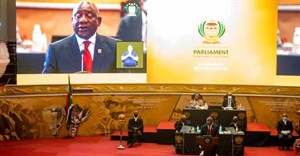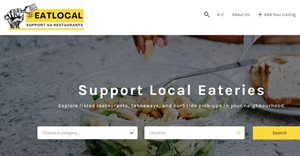#AfricaMonth
Trending





 Netflix reaches 40m users for ad supported planKarabo Ledwaba
Netflix reaches 40m users for ad supported planKarabo Ledwaba
Elections 2024
Jobs
- Junior Digital Business Writer Roodepoort
- WordPress Website Designer/Graphic Designer Johannesburg
- Telesales Representative Durban
Power to the IOL title sites
Bizcommunity: You've been in the job since the beginning of the year [having moved from being Business Report editor after years of being an economics and business journalist] and are new to online? Why the move?
Quentin Wray: The previous IOL general manager had resigned and there was an opening. At that point, I was looking at my career. I'd done content for a long time and, even though editing a paper like Business Report was fantastic, I actually wanted to run a business.

Biz: Many journalists would run a mile from running a business.
Wray: Ja, but I was an accountant for 10 years before I became a journalist [13 years ago]. I did a Bachelor of Economics... I was feeling I wanted to stretch myself... I've always found management very interesting and I like the idea of being able to learn a new skills set. It's not often that you get an opportunity when you're in your 40s to do something completely fresh and new and interesting.
Biz: What have been the main challenges since taking over?
Wray: Figuring out what the techies are saying, to be honest, because it's an entirely new language. Coming from being a print journalist and a print editor, suddenly there's a whole new publishing model and you've got a wealth of technology that is behind the system.
When I was at Business Report, it was almost as if there was a technology fairy. If you whinged, magic happened and it was fixed. And you made up a page and printed it so it was quite static once you'd decided what goes where - the process is about making it fit and making it right and all of those good things.
So one of the big challenges was coming in and learning a new industry from an absolute standing start. Like a lot of journalists, I consume a lot of media. I've always read websites but I hadn't really thought about how they get produced because I was pretty much a print snob.
Also, taking over a job where it's not just a team of reporters [is a challenge]. Here [at IOL] there is the editorial staff and the sales staff and technical staff - and everyone has to be managed differently. I'm finding it absolutely fascinating, getting into the nuts and bolts of how to generate revenue.
Biz: Let's talk about revenue. Is it driven mostly by display advertising?
Wray: Ja, but one of the advantages of being a private company is that we don't have to disclose our numbers in any detail.
Biz: Although South Africa is behind the curve in terms of online advertising, it is growing. What's your impression of what advertisers want from online ads?
Wray: I think one of the cardinal errors that people make is in thinking that, because online is online, it's different. My approach coming into the job - and it's been confirmed since I've been in the job - is that it doesn't matter what media you're in, everything is about content. If you don't give people content that they want, you're not going to be in business.
My focus has been getting the content as good as it can be and then looking at how to monetise it... My view is that the online industry - and maybe this is hopeless naivety that's going to be proven wrong over time - is at a sweet spot. I think people are realising that somehow it's got to be paid for, that it's not magically produced for free... So we're all sort of muddling through this and figuring it out [how to monetise our sites] but I don't think there's an inherent desire by advertisers not to pay fair value for what they get. I just think that the measurement, of what that fair value is, is up in the air at the moment.
Biz: One one side of the spectrum in South Africa, there is News24 and its model has been to get the scale and, thereafter, to segment the audience. On the other side, you have plenty of web-only operators that are niche - such as MyBroadband, TechCentral, Bizcommunity. So where do you see IOL fitting in?
Wray: Well, what sets us apart in this market is that we have something like 17 newspapers titles - and these titles have been in peoples' houses for generations. Take the Cape Argus, for instance: it's about 150 years old. The Star is about 120 years old. The Mercury is old.
In all of our markets we are the dominant publication as a general rule, though there are some exceptions. So I want to be able to have the big-scale online news organisation, which is IOL, but we're also building a tremendously powerful suite of title sites... What we're going to be able to do is offer advertisers the best of both - and leverage content between the two.
Biz: That's interesting because IOL has had pay walls up on its title sites for a long time.
Wray: It used to be that you had to be a [print] subscriber to read the stories [on the online title sites]. That's fallen away. Our title sites are quite limited at the moment but we're still getting quite nice traffic at some of them. This has been my first area of focus [since taking over the job]: to beef up these title sites and do credit to the brands that they represent. These are amazing brands.
Biz: So is the idea that your title sites will give you community - and all these communities will give you scale of audience?
Wray: Yes, but it will also support print, which is one of my KPIs [key performance indicators].
Biz: That's quite hard to do.
Wray: It is hard but, you know, IOL is a small part of Independent Newspapers even though it's a big business in its own right. And the reality is I get my content from print so I can't pretend to sail in a different sea. The reason for the strategy is that we can build on our existing scale but it will also allow the editors of the titles to extend their brands.
I think that, when I was a print editor, that was something I wanted our site to do for us: to give us the extra pages we didn't have. All print editors complain they don't have enough space. IOL can give them the space and use the web to generate user-driven content and for things like spill-over of letters. There's a lot of synergy and what I'm trying to do is build that relationship [between print and online].
Biz: And are the editors interested?
Wray: They're very excited. I think change always makes people ask questions and one of them is: "Where are we going to get the resources to do this?" But the system we're designing is quite cutting-edge and efficient.
Biz: Now what about tablets. Are you guys working on iPad apps?
Wray: I can only say: "Watch this space". We are looking at apps but we're also not going to be snobbish about the devices that we design for.
Biz: Mobile is important.
Wray: Yes, especially in South Africa. We have a very good mobile site and we get quite a bit of traffic through that. It doesn't get as much love as it needs to but that is something we're sorting out. But if you think monetising on a PC is hard - monetising on a cellphone is even harder.
Biz: Do you have quite a big development complement dedicated to IOL?
Wray: Not really. We have a technical team that works for IOL, housed in the company's IT structure, but it's a small team. What that means for us is that we have to be a bit clever about how we sequence things and how we prioritise things because Independent Newspapers is not going to write me a blank cheque and let me go off and play - and, frankly, I think they're right not to. The days of online not having to make money are over.
Biz: IOL is profitable, isn't it?
Wray: Yes. But I look at the numbers and I can see huge pockets of opportunity for us that we can tap into without spending too much.
Biz: Like what?
Wray: There are some areas in which we're very under-represented and we're putting in place strategies to tap into that. We're not going to be inventing new businesses. Basically, we've got to get the current business working as efficiently as we can before we go inventing new ones.
Biz: What are you most pleased with since taking over?
Wray: I think we're shooting the lights out on some of our revenue lines. There's a sense of excitement and a willingness to chuck out the rule book and to innovate - and meet clients along the line and say: "Tell us what you want and we'll see what we can do."
So there's a flexibility in the business and it's growing very nicely and I think our content offering is very good. And, you know, in print, you often had people coming to you to complain and ask you to pull stories and you got to tell them to "sod off". I got to do that the other day [at IOL] and I thought; "Hey, I can still be a journalist."
Follow Quentin Wray on Twitter at @qwray.
For more:
- Bizcommunity: Major Mail & Guardian Online redesign in the works (interview with M&G Online editor Chris Roper), April 2011
- Bizcommunity: Digital space rewards those who are first - 24.com GM Geoff Cohen, March 2011
- Bizcommunity: Kindle loves M&G; iPad loves less, Feb 2011
- Bizcommunity: Converged newsrooms can be done - even in our lifetimes, October 2010
- Bizcommunity: News sites go after critical mass, ad model still elusive, May 2010













